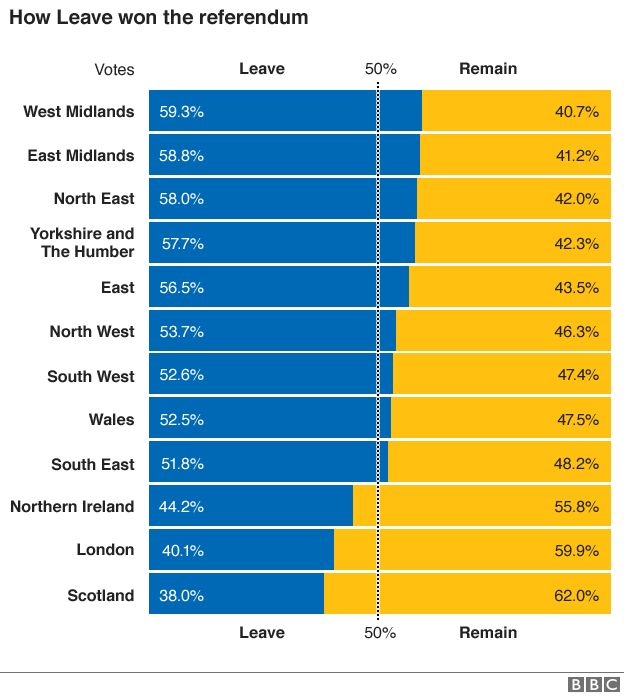While Scotland and Northern Ireland backed staying, every English region except London voted to leave.
The England vote was 53.4% for Leave and 46.6% for Remain.
Boroughs on or near England's east coast delivered the biggest wins for Leave, with Boston in Lincolnshire recording the highest Leave percentage.

Leave polled 15,188,406 votes while Remain had 13,266,996 in England. It meant the majority for Leave was 1,921,410 in England, compared with a UK-wide majority of 1,269,501.
Turnout across England was 73% with 28.4 million ballots cast.
Chiltern in Buckinghamshire had the highest turnout in England - 83.5% - and Remain won by 55% to 45%.
The lowest turnout was in Newham in London where 59.2% of registered voters cast a ballot.
Nine of the 10 areas with the highest turnouts voted to Remain in the EU.
The UKIP leader told activists in the Netherlands they can strike a hammer blow for democracy and freedom if they reject an expansionist EU plot in Wednesday's crunch vote.
He said that a 'no' vote would open the eyes of the British electorate to the growing anti-Brussels sentiment sweeping across the continent and bury the argument that the UK is the only country dissatisfied with the sclerotic regime.
In a rousing speech to eurosceptic campaigners Mr Farage said the Dutch people could provide extra momentum for an "epoch-shattering" Brexit which would bring about the downfall of the undemocratic EU.
He told a meeting of activists in Volendam: "Let's celebrate this outbreak of democracy that has happened in this country and let's hope that it spreads like a rash across the rest of Europe, because everybody in this union deserves the right to have a say on the direction of the European Union.
"If you vote no, that will have some real consequences. If in the course of the next three months your vote is the hors d'oeuvres, then our vote is the main course.
"Too often the so-called liberal elite, who are actually a highly illiberal elite, say to the eurosceptics in my country 'look stop being so silly, stop behaving like islanders, stop being backward - don't you understand that on the other side of the north sea everybody thinks that the European project is completely and utterly wonderful?'
David Cameron has resigned as Prime Minister after UK voters made the historic decision to leave the European Union.
A tearful Mr Cameron - his wife by his side - said the country needed "fresh leadership" and is understood to have met the Queen this morning at Buckingham Palace.
The PM campaigned to remain in the EU but the public rejected his arguments and chose to leave by 51.9% to 48.1%.
Speaking outside Downing Street, the PM said he would aim to have a new leader in place by the Conservative party conference in October.
Mr Cameron also tried to ease the economic fallout of Brexit that sawmore than £50bn wiped off the value of the UK's biggest companiesand triggered a big drop in the value of the pound.
The PM stressed the economy was "fundamentally strong" and said there would be no immediate changes for businesses - as well as for EU citizens in the UK or Britons living in Europe.
"There will be no initial change in the way our people can travel, in the way our goods can move or the way our services can be sold," Mr Cameron said. Trade issues will be at the heart of talks to thrash out exactly how Britain's relationship with the EU will work in future - negotiations that many expect will last for years.
A spokesman said: "EU laws and regulations impact on many council services, such as waste, employment, health and safety, consumer protection and trading and environmental standards.
"There cannot be an assumption that power over these services is simply transferred from Brussels to Westminster. If services are delivered locally, then the power over how to run them should rest locally too. Decades of centralised control over funding and services has distanced our residents from the decisions that affect their everyday lives. With greater control in our areas we can improve services and save money."
No comments:
Post a Comment